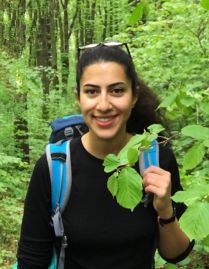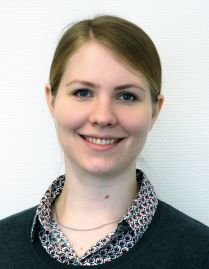Doctoral researchers

Helyaneh Moeinizadeh
Helyaneh.Moeinizadeh@med.uni-jena.de
Investigation of various novel surgical matrices for their anti-adhesive properties against human pathogen
University Hospital Jena
Institute for Infectious Diseases and Infection Control

Anna Möslinger
anna.moeslinger@leibniz-hki.de
Regulation of Candida albicans metabolism and filamentation by protein kinase and transcription factor signaling pathways
ZIK Septomics
Host Fungal Interfaces

Tina Müller
Host defense mechanisms against pathogens mediated by sphingolipids
University Hospital Jena
SG Sepsis Research

Faiza Nazar
The role of CD4+ Foxp3+ regulatory T cells for gut microbiome constitution: atherosclerosis and modulatory effects of physical exercise
University Hospital Jena
Clinic for Cardiac and Thoracic Surgery

Neetu Neetu
Optimization of microbial production biostimulants with innovative additives and mycorrhiza helper bacteria
Friedrich Schiller University
Molecular Phytopathology

Ayda Nemati Vesali Azar
Stimulus release from structured glass surfaces
Friedrich Schiller University
Otto Schott Institute of Materials Research - Glass Chemistry

Sophie Neumann
Optimization of fluorescence microscopy for microbial research
Friedrich Schiller University
Superresolution Microscopy

Liubov Nikitashina
liubov.nikitashina@leibniz-hki.de
Microbiota-driven risk assessment, prevention and clearance of invasive aspergillosis
Leibniz Institute for Natural Product Research and Infection Biology – Hans Knöll Institute (HKI)
Molecular and Applied Microbiology

Vera Nikitashina
Mechanisms of metabolic interactions in photosymbiotic systems
Friedrich Schiller University
Institute for Inorganic and Analytical Chemistry

Adrian Nowotnick
Switchable antimicrobial materials
Friedrich Schiller University
Otto Schott Institute of Materials Research - Materials Science

Janine Otto
Mass Spectrometry as Fast Tool for the Comparative DNA Methylome Analysis
Friedrich Schiller University
Institute for Inorganic and Analytical Chemistry

Xiaoqing Pan
The role of RNA structure in fungal pathogenesis
Leibniz Institute for Natural Product Research and Infection Biology – Hans Knöll Institute (HKI)
RNA Biology of Fungal Infections

Ailton Pereira da Costa Filho
Identification of fungal-bacterial interactions in the environment that shape human pathogenicity in fungi
Leibniz Institute for Natural Product Research and Infection Biology – Hans Knöll Institute (HKI)
Fungal Informatics

Victor Hugo Pérez Carrillo
victor.perez.carrillo@uni-jena.de
Dynamics of bacterial ABC transporters
Friedrich Schiller University
Biostructural Interactions

Marion Perrier
Comparative pan-transcriptomics of Aspergillus fumigatus
Leibniz Institute for Natural Product Research and Infection Biology – Hans Knöll Institute (HKI)
Fungal Informatics

Wallapat Phongtang
wallapat.phongtang@uni-jena.de
Host Range Evolution Potential of Bacteriophages
Friedrich Schiller University
Viral Ecology and Omics

Sebastian Pietschmann
sebastian.pietschmann@jsmc.info
Microbial succession in heavy-metal contaminated soils during in-situ phytoremediation
Friedrich Schiller University
Institute of Microbiology - Microbial Communication

Jan-Philipp Prätorius
jan-philipp.praetorius@jsmc.info
Automated analysis of microscopic image data of hostpathogen interactions
Leibniz Institute for Natural Product Research and Infection Biology – Hans Knöll Institute (HKI)
Applied Systems Biology

Rhedia Tehrin Proma
Use of microorganisms in peat-free and peat-reduced substrates
Friedrich Schiller University
Molecular Phytopathology

Annica Pschibul
Molecular mechanisms of antifungal resistance and therapeutic strategies to manage infections with triazole
Leibniz Institute for Natural Product Research and Infection Biology – Hans Knöll Institute (HKI)
Molecular and Applied Microbiology





